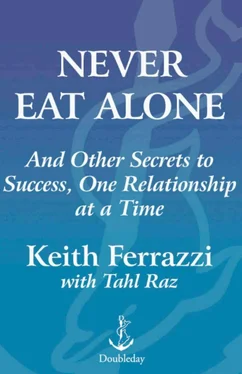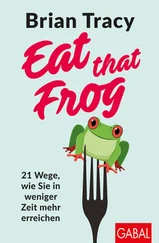Keith Ferrazzi - Never Eat Alone
Здесь есть возможность читать онлайн «Keith Ferrazzi - Never Eat Alone» весь текст электронной книги совершенно бесплатно (целиком полную версию без сокращений). В некоторых случаях можно слушать аудио, скачать через торрент в формате fb2 и присутствует краткое содержание. Год выпуска: 2005, ISBN: 2005, Издательство: C U R R E N C Y • D O U B L E D A Y, Жанр: marketing, на английском языке. Описание произведения, (предисловие) а так же отзывы посетителей доступны на портале библиотеки ЛибКат.
- Название:Never Eat Alone
- Автор:
- Издательство:C U R R E N C Y • D O U B L E D A Y
- Жанр:
- Год:2005
- ISBN:0-385-51529-4
- Рейтинг книги:4 / 5. Голосов: 1
-
Избранное:Добавить в избранное
- Отзывы:
-
Ваша оценка:
- 80
- 1
- 2
- 3
- 4
- 5
Never Eat Alone: краткое содержание, описание и аннотация
Предлагаем к чтению аннотацию, описание, краткое содержание или предисловие (зависит от того, что написал сам автор книги «Never Eat Alone»). Если вы не нашли необходимую информацию о книге — напишите в комментариях, мы постараемся отыскать её.
Never Eat Alone — читать онлайн бесплатно полную книгу (весь текст) целиком
Ниже представлен текст книги, разбитый по страницам. Система сохранения места последней прочитанной страницы, позволяет с удобством читать онлайн бесплатно книгу «Never Eat Alone», без необходимости каждый раз заново искать на чём Вы остановились. Поставьте закладку, и сможете в любой момент перейти на страницу, на которой закончили чтение.
Интервал:
Закладка:
I went straight up to the man in the center of all this action, introduced myself, and asked him point blank, "Who are you?"
"I'm the CEO of this firm," he said with an abruptness that signaled I should have known that, while the partners around him smiled and chuckled mischievously.
He was about six-foot-three, barrel-chested, and very, very direct. He's the kind of guy who just fills the room with his presence.
"Well, I guess I should have known that," I responded.
"Yeah, I guess you should have," he said. He was joking, and as is often the case with people in positions of power, he liked my candor and chutzpah. He introduced himself as Pat Loconto.
"Loconto," I said. "That's a good Jewish name, isn't it?"
He laughed, and I talked with him in the little Italian that he and I knew. In short order, we were fully engaged, talking about our families and our similar upbringing. His dad was also a firstgeneration Italian-American who instilled in him many of the same values my father had taught me. I did, in fact, know Pat, but only by reputation. I had heard about his no-nonsense style— tough and tireless but warmhearted, too. I decided then and there that getting to know him better might not be a bad idea.
That I approached him at the cocktail party and discovered we were cut from similar cloth deepened my respect for the man and his respect for me. I found out later that quickly after that exchange, he followed up and found out everything about me and my summer with the firm. That night I hung out with Pat and the senior partners into the wee hours of the morning. I didn't try to be anyone I wasn't. I didn't overstretch and pretend to know more than I did. Many people believe that's what it takes when reaching out to those above you, but in truth that often results in making a jerk out of yourself.
I remembered that my father and mother had told me to speak less in such situations; the less you say, the more you'll likely hear. They were warning me, given my predisposition for dominating a conversation from an early age. That's the way you learn from others, Dad said, and glean the small nuances that will help you engender a deeper relationship later on. There's also no better way to signal your interest in becoming a mentee. People tacitly notice your respect and are flattered by the attention. That said, quiet for me isn't exactly quiet. I asked tons of questions, suggested things that I saw from the summer, and conspired with these leaders of the firm on what was important to them—making the firm a success.
Mentoring is a very deliberate activity that requires people to check their ego at the door, hold back from resenting other people's success, and consciously strive to build beneficial relationships whenever the opportunity arises. Other interns at that party looked at Pat and the other senior partners with intimidation and boredom (What do I have in common with them?) and therefore kept their distance. They looked at their job titles versus the bigwigs' and felt excluded, and because of it, they were.
When I finally graduated from school, in typical MBA fashion, I interviewed with several companies. My choice was coming down to Deloitte Consulting and one of their competitors, McKinsey. McKinsey was then considered the gold standard of consulting companies. For most of my peers, the choice would have been obvious.
Then, one afternoon, I got a call the day before my final McKinsey interview. When I picked up the phone, I was met with a familiar gruff voice. "Accept our offer now and you can come down to New York for dinner this evening with me and some of my partners." Before I had a chance to respond, he said, "It's Pat Loconto. I want to know if you're coming to Deloitte or not?"
I told Pat, uncomfortably, that I hadn't decided on where I'd end up. But I had an idea that might help me through the process. "Listen, I'm still up in the air," I told him. "But it would help if I had dinner with you and a few partners to get a better feel for what I'd be doing and where the organization is headed."
"I'll have dinner with you only if you accept my offer," he said. Pat was joking again, and I liked him even more for his unorthodox recruiting practices. Then he let me off the hook with, "OK, get your butt down to New York, and don't worry, we'll get you out to Chicago in the morning for your interview." Now, how did he know about my interview?
So I found myself with Pat and a few partners around a table at Grifone, their favorite Italian restaurant in Manhattan. The banter was hard and heavy, as was the drinking. We had gone through bottles and bottles of great wine and a few cognacs on top of that. Near the end of dinner, Pat threw out his pitch and actually launched into a fairly shocking tirade.
"Who the hell do you think you are? You think McKinsey gives a damn about Keith Ferrazzi?" Before I could answer, he continued. "You think the CEO of McKinsey knows who you are? You think any of the senior partners would take a Sunday night to have dinner with you? You'll be just another number-crunching MBA grad lost in the shuffle. We care about you. We want you to be successful here. More importantly, we think you can make a difference in our firm."
Was I in? Pat demanded to know.
Wow, his pitch was compelling, and right then my instinct told me he was right. I knew he was right. But I wasn't about to leave that dinner without making a small pitch of my own.
"Look, I'll make you a deal," I said. "If I accept your offer, all I ask is that you give me three dinners a year at this very restaurant for as long as I'm at Deloitte. I'm in if you're in."
He looked me in the eyes and then with the biggest smile said, "Great. Welcome to Deloitte."
By the way, I then asked him for more money. He just shook his head and laughed. Well, it never hurts to ask; the worst he could have said was no. So, after three hours in a restaurant, this man convinced me to make a life-changing career decision without one word about title, salary, or even one detail of how he expected I might make a difference.
Honestly, I still had my doubts at the beginning that I had made the right move. In consulting, Deloitte's was smaller potatoes those days; its prestige didn't compare with McKinsey's.
But what a right move I had made—in fact, it was the best of my life. First, because I went to Deloitte Consulting, I was given more responsibilities and I learned more about consulting in the eight years that followed than most people learn in twenty. Second, I found I could make a difference given my access to the senior partners. Third, and most important, I realized that finding a talented, experienced mentor who is willing to invest the time and effort to develop you as a person and a professional is far more important than making career decisions based purely on salary or prestige.
Besides, back then the money wasn't important. You learn in your twenties, as the saying goes, and earn in your thirties. And boy, did I ever learn. Each year, Pat and I had at least three dinners at Grifone, that same Italian restaurant. For my entire tenure at Deloitte, I had the ear of the CEO, and he kept asking about me among his partners. He was looking out for me the entire time.
Ultimately, of course, I got to work closely with Pat and other amazing men and women at Deloitte, and it taught me the importance of attaching yourself to great people, great teachers. Not that working with Pat and his right-hand man Bob Kirk was easy. They taught me some hard lessons about staying focused; that bold ideas weren't enough if they couldn't be executed; that the details are as significant as the theories; that you had to put people first, all people, not just those above you. Pat probably should have fired me a few times. Instead, he invested time and energy into making me the kind of executive—and more important, the kind of leader—he wanted me to be for the sake of the firm and for the sake of his role as mentor.
Читать дальшеИнтервал:
Закладка:
Похожие книги на «Never Eat Alone»
Представляем Вашему вниманию похожие книги на «Never Eat Alone» списком для выбора. Мы отобрали схожую по названию и смыслу литературу в надежде предоставить читателям больше вариантов отыскать новые, интересные, ещё непрочитанные произведения.
Обсуждение, отзывы о книге «Never Eat Alone» и просто собственные мнения читателей. Оставьте ваши комментарии, напишите, что Вы думаете о произведении, его смысле или главных героях. Укажите что конкретно понравилось, а что нет, и почему Вы так считаете.












